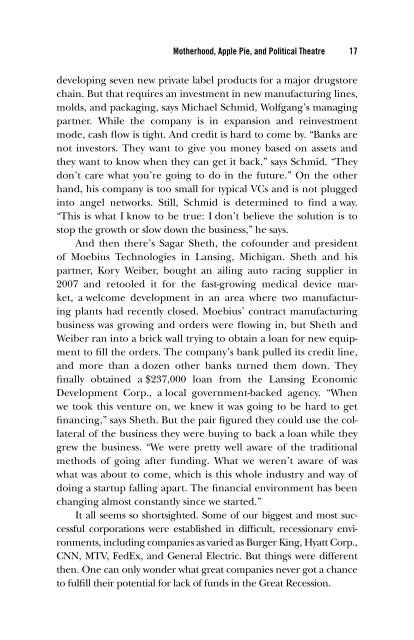3c hapter - Index of
3c hapter - Index of
3c hapter - Index of
You also want an ePaper? Increase the reach of your titles
YUMPU automatically turns print PDFs into web optimized ePapers that Google loves.
Motherhood, Apple Pie, and Political Theatre 17<br />
developing seven new private label products for a major drugstore<br />
chain. But that requires an investment in new manufacturing lines,<br />
molds, and packaging, says Michael Schmid, Wolfgang’s managing<br />
partner. While the company is in expansion and reinvestment<br />
mode, cash fl ow is tight. And credit is hard to come by. “Banks are<br />
not investors. They want to give you money based on assets and<br />
they want to know when they can get it back,” says Schmid. “They<br />
don’t care what you’re going to do in the future.” On the other<br />
hand, his company is too small for typical VCs and is not plugged<br />
into angel networks. Still, Schmid is determined to fi nd a way.<br />
“This is what I know to be true: I don’t believe the solution is to<br />
stop the growth or slow down the business,” he says.<br />
And then there’s Sagar Sheth, the c<strong>of</strong>ounder and president<br />
<strong>of</strong> Moebius Technologies in Lansing, Michigan. Sheth and his<br />
partner, Kory Weiber, bought an ailing auto racing supplier in<br />
2007 and retooled it for the fast- growing medical device market,<br />
a welcome development in an area where two manufacturing<br />
plants had recently closed. Moebius’ contract manufacturing<br />
business was growing and orders were fl owing in, but Sheth and<br />
Weiber ran into a brick wall trying to obtain a loan for new equipment<br />
to fi ll the orders. The company’s bank pulled its credit line,<br />
and more than a dozen other banks turned them down. They<br />
fi nally obtained a $237,000 loan from the Lansing Economic<br />
Development Corp., a local government- backed agency. “When<br />
we took this venture on, we knew it was going to be hard to get<br />
fi nancing,” says Sheth. But the pair fi gured they could use the collateral<br />
<strong>of</strong> the business they were buying to back a loan while they<br />
grew the business. “We were pretty well aware <strong>of</strong> the traditional<br />
methods <strong>of</strong> going after funding. What we weren’t aware <strong>of</strong> was<br />
what was about to come, which is this whole industry and way <strong>of</strong><br />
doing a startup falling apart. The fi nancial environment has been<br />
changing almost constantly since we started.”<br />
It all seems so shortsighted. Some <strong>of</strong> our biggest and most successful<br />
corporations were established in diffi cult, recessionary environments,<br />
including companies as varied as Burger King, Hyatt Corp.,<br />
CNN, MTV, FedEx, and General Electric. But things were different<br />
then. One can only wonder what great companies never got a chance<br />
to fulfi ll their potential for lack <strong>of</strong> funds in the Great Recession.
















